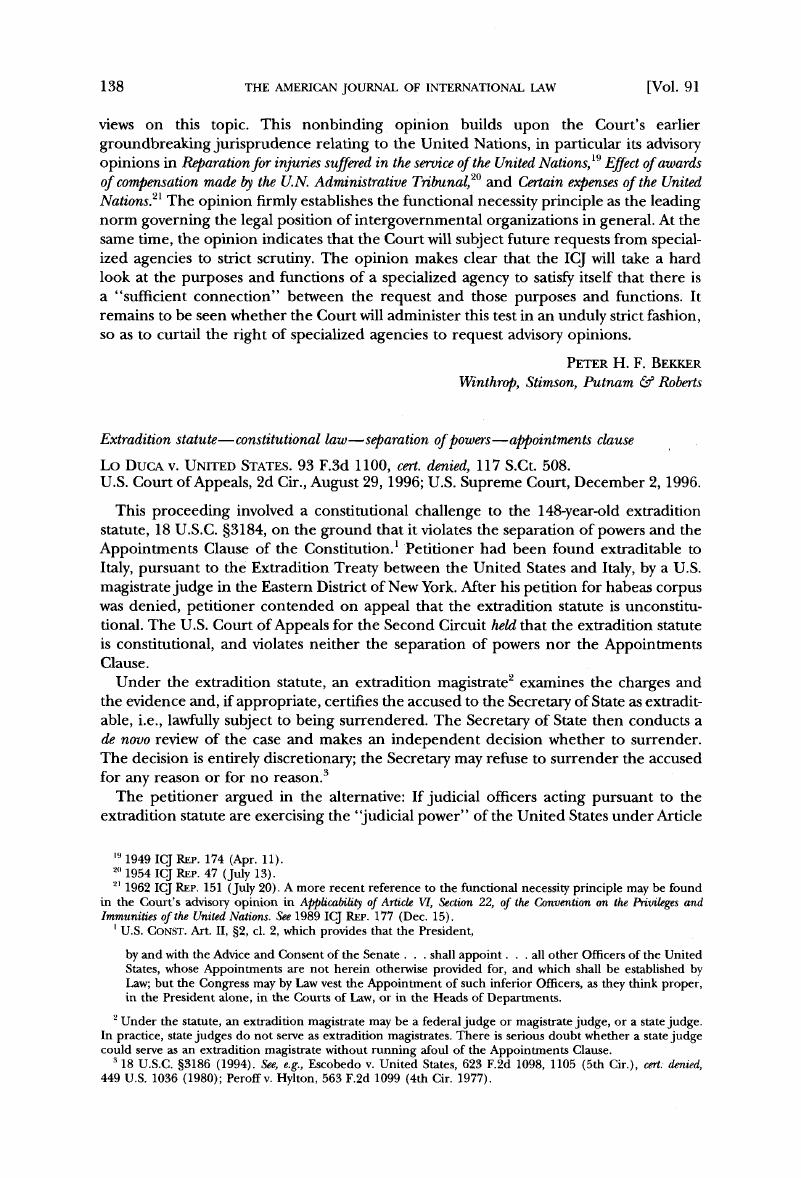No CrossRef data available.
Article contents
Lo Duca v. United States
Published online by Cambridge University Press: 27 February 2017
Abstract

- Type
- International Decisions
- Information
- Copyright
- Copyright © American Society of International Law 1997
References
1 U.S. Const. Art. II, §2, cl. 2, which provides that the President,
by and with the Advice and Consent of the Senate … shall appoint … all other Officers of the United States, whose Appointments are not herein otherwise provided for, and which shall be established by Law; but the Congress may by Law vest the Appointment of such inferior Officers, as they think proper, in the President alone, in the Courts of Law, or in the Heads of Departments.
2 Under the statute, an extradition magistrate may be a federal judge or magistrate judge, or a state judge. In practice, state judges do not serve as extradition magistrates. There is serious doubt whether a state judge could serve as an extradition magistrate without running afoul of the Appointments Clause.
3 18 U.S.C. §3186 (1994). See, e.g., Escobedo v. United States, 623 F.2d 1098, 1105 (5th Cir.), cert. denied, 449 U.S. 1036 (1980); Peroff v. Hylton, 563 F.2d 1099 (4th Cir. 1977).
4 Originally, “the Executive exercised complete control over extradition without reference to the courts.” Eain v. Wilkes, 641 F.2d 504, 513 n.13 (7th Cir.), cert, denied, 454 U.S. 894 (1981) (citing M. Cherif Bassiouni, International Extradition and World Public Order 505 (1974)). Here, the Second Circuit observed that the statute had been enacted as the result, in part, of public clamor for some form of judicial involvement in the extradition process, and that in the absence of the statute, the executive branch “would retain plenary authority to extradite.” 93 F.3d 1100, 1103 n.2 (citing Fong Yue Ting v. United States, 149 U.S. 698, 714 (1893)).
5 The language of the statute, which confers authority on individual “justices,” “judges” and “magistrates,” rather than on “courts,” supports the conclusion that the judicial involvement created by the statute is not based on Article III. 93 F.3d at 1107.
6 See, e.g., In re Metzger, 46 U.S. (5 How.) 176, 191 (1847); Martin v. Warden, 993 F.2d 824, 828 (11th Cir. 1993); Austin v. Healy, 5 F.3d 598, 603 (2d Cir. 1993), cert, denied, 510 U.S. 1165 (1994).
7 93 F.3d at 1110–11.
8 Id. at 1110 (citing Weiss v. United States, 510 U.S. 163 (1994); Shoemaker v. United States, 147 U.S. 282 (1893)).
9 93 F.3d at 1111 n.11.
10 893 F.Supp. 65 (D.D.C. 1995), summarized in 90 AJIL 102 (1996).
11 Lobue v. Christopher, 82 F.3d 1081 (1996). On July 1, 1996, the court denied the accuseds’ petition for rehearing and suggestion for rehearing en banc.
12 See, e.g., In re Sidali, 899 F.Supp. 1342, 1350 (D.N.J. 1995) (declining to decide the constitutionality of the extradition statute “in favor of a full appellate review of Lobue”).
13 See, e.g., Sandhu v. Bransom, 932 F.Supp. 822, 826 (N.D. Tex. 1996); In re Marzook, 924 F.Supp. 565, 570–72 (S.D.N.Y. 1996); In re Lin, 915 F.Supp. 206, 211–15 (D. Guam 1995); In re Sutton, 908 F.Supp. 631 (E.D. Mo. 1995); In re Lang, 905 F.Supp. 1385 (CD. Cal. 1995); Carreno v. Johnson, 899 F.Supp. 624 (S.D. Fla. 1995). Every district court that has decided the constitutional issues has declined to follow Lobue.
14 See Hayburn’s Case, 2 U.S. (2 Dall.) 408 (1792); United States v. Ferreira, 54 U.S. (13 How.) 40 (1852).


